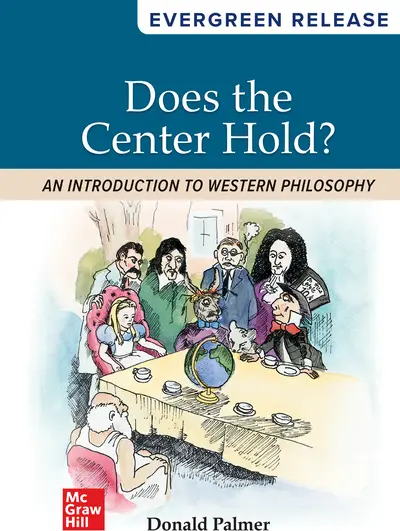My Account Details

ISBN10: 1266551433 | ISBN13: 9781266551437

Does the Center Hold? An Introduction to Western Philosophy
Product not yet available for student view. Change to an older release to view student options.
- Lowest Price!
McGraw Hill eBook
Textbook Rental (150 Days Access)
- Rent for a fraction of the printed textbook price
- Complete text bound in hardcover or softcover
Loose-Leaf Purchase
Unbound loose-leaf version of full text
Shipping Options
- Standard
- Next-day air
- 2nd-day air
Orders within the United States are shipped via FedEx or UPS Ground. For shipments to locations outside of the U.S., only standard shipping is available. All shipping options assume the product is available and that processing an order takes 24 to 48 hours prior to shipping.
Note: Connect can only be used if assigned by your instructor.
Connect (180 Days Access)
- Digital access to a comprehensive online learning platform
- Includes homework, study tools, eBook, and adaptive assignments
- Download the free ReadAnywhere app to access the eBook offline
Connect + Loose-Leaf
- Comprehensive online learning platform + unbound loose-leaf print text package
- Connect includes homework, study tools, eBook, and adaptive assignments
- Download the free ReadAnywhere app to access the eBook offline
Shipping Options
- Standard
- Next-day air
- 2nd-day air
Orders within the United States are shipped via FedEx or UPS Ground. For shipments to locations outside of the U.S., only standard shipping is available. All shipping options assume the product is available and that processing an order takes 24 to 48 hours prior to shipping.
McGraw Hill eBook
Details:
- Normally the lowest price option for student
- Integrates in your LMS
- Accessible tools for students, including read-aloud functionality, jump links and dynamic note-taking and highlighting features
Textbook Rental (150 Days Access)
Details:
- Rentable option
- Hardcopy and softcover formats
Loose-Leaf Purchase
Details:
- Unbound loose-leaf version of full text
Connect (180 Days Access)
Details:
- Integrates in your LMS
- Prebuilt courses, presentation slides and instructor resources
- Test question banks, adaptive assignments, essay prompts, video content and more interactive exercises specific to your course subject
- eBook access (with included ReadAnywhere app)
- Print book add-on availability
- Remote proctoring
Connect + Loose-Leaf
Details:
- Comprehensive online learning platform + unbound loose-leaf print text package
- Connect includes homework, study tools, eBook, and adaptive assignments
- Download the free ReadAnywhere app to access the eBook offline
* The estimated amount of time this product will be on the market is based on a number of factors, including faculty input to instructional design and the prior revision cycle and updates to academic research-which typically results in a revision cycle ranging from every two to four years for this product. Pricing subject to change at any time.
Does the Center Hold? is an entertaining, topically organized introduction to philosophy program with more than 500 original illustrations. The ideas and issues typically covered in introductory courses are presented here in a remarkably accessible and enjoyable manner. With the help of small questions used to tackle the broader inquiry, students learn to think carefully, and they walk away with an appreciation of the discipline of philosophy. Donald Palmer engagingly demonstrates that serious philosophical inquiry may be perplexing, but it is ultimately liberating. Connections are made between philosophy and other fields, including art, literature, physics, sociology, psychology, and psychoanalysis. Students discover there is a certain kind of philosophical analysis and form of argument whose skills can be learned and applied to other areas of their lives, both personal and professional.
2 Truth Is Beauty; Beauty is Truth
3 What You See is What You Get
4 Who’s on First; What’s on Second?
5 Mount Olympus, Mount Moriah, and Other Godly Places
6 The Largest Airline in the Free World
7 Thou Shalt Become Perfected
8 Different Strokes for Different Folks
9 Let Them Eat Cake
10 But Is It Art?
About the Author
Donald Palmer
Donald Palmer received his Bachelor’s and Master’s degrees from the University of California Berkeley and his Doctorate of Philosophy and Letters at the University of Navarra in Pamplona, Spain. He has published a number of philosophy books, including Looking at Philosophy, Does the Center Hold?, Why It’s Hard to Be Good, and, more popularly, Kierkegaard for Beginners, Sartre for Beginners, and Structuralism and Post-Structuralism for Beginners. He has recently completed a manuscript on Don Quixote titled Philosophy and Madness in La Mancha. He taught for many years at the College of Marin in California and finished his teaching career at North Carolina State University. He and his wife divide their time among North Carolina, the San Francisco Bay Area, and the Lot Valley in Southwestern France.
Need support? We're here to help - Get real-world support and resources every step of the way.